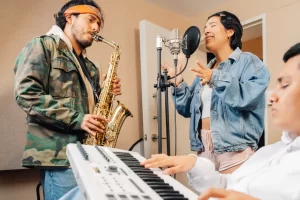Music has the incredible power to captivate our emotions, connect us with others, and express the depths of our innermost thoughts and feelings. Whether you’re an aspiring musician, a seasoned performer, or someone who simply appreciates the beauty of music, unlocking your musical potential is a journey worth embarking on.In this blog post, we will delve into the world of musical development and share valuable tips and techniques to help you elevate your skills to new heights. Regardless of your current level of expertise, this guide is designed to provide insights and strategies that will benefit musicians of all backgrounds and genres.
Throughout this article, we will explore various aspects of musical growth, from honing your technical proficiency to expanding your creative horizons. We will delve into the importance of cultivating a growth mindset and setting clear musical goals. Additionally, we will discuss the significance of proper technique, the value of ear training and music theory, and the importance of creative exploration.
We understand that the path to musical mastery can be both challenging and rewarding. That’s why we aim to equip you with practical advice, exercises, and resources that will enhance your practice sessions and fuel your progress. Furthermore, we will address common obstacles that musicians face and provide guidance on how to overcome them while staying motivated and inspired.
Whether you’re an instrumentalist, vocalist, songwriter, or producer, this guide will offer you valuable insights to unlock your musical potential and bring your skills to new heights. So, let’s dive in and discover the transformative power of deliberate practice, creative exploration, and a mindset primed for growth. Get ready to embark on an exciting journey of musical development that will take your passion for music to extraordinary levels.
Setting the Foundation
Embracing a growth mindset in music
Music, like any other art form, requires dedication, persistence, and a willingness to embrace growth. Adopting a growth mindset is essential for unlocking your musical potential. Instead of viewing your abilities as fixed or limited, a growth mindset recognizes that with effort, practice, and a positive attitude, you can continually improve and expand your skills.
To cultivate a growth mindset, start by reframing challenges as opportunities for growth. Embrace the mindset that mistakes and setbacks are valuable learning experiences rather than failures. Emphasize the process of learning and improvement rather than focusing solely on the end result. By adopting this mindset, you’ll be more open to taking risks, exploring new musical territories, and pushing the boundaries of your comfort zone.
Identifying personal musical goals
Setting clear and meaningful goals is crucial for guiding your musical development. Take some time to reflect on what you hope to achieve as a musician. Do you aspire to master a particular instrument or vocal technique? Are you interested in composing your own music? Are you looking to perform on stage or collaborate with other musicians?
Once you have identified your goals, break them down into smaller, actionable steps. This will make them more attainable and help you track your progress along the way. For example, if your goal is to learn a complex piece on the piano, you can break it down into sections and dedicate specific practice sessions to mastering each section. By setting achievable milestones, you’ll experience a sense of accomplishment as you reach each one, fueling your motivation to continue growing.
Creating a practice routine
Consistency is key when it comes to developing your musical skills. Establishing a regular practice routine will help you make steady progress and build a strong foundation. Determine a schedule that works best for you, considering your other commitments and energy levels.
When designing your practice routine, strive for a balance between focused and varied practice. Dedicate time to specific technical exercises that target your areas of improvement, whether it’s scales, arpeggios, or vocal warm-ups. Additionally, allocate time for repertoire practice, where you work on pieces or songs that challenge you and allow you to apply your technical skills in a musical context.
Remember, quality is more important than quantity when it comes to practice. Aim for focused, concentrated sessions rather than mindless repetition. Take breaks when needed to avoid mental and physical fatigue. By establishing a consistent practice routine and maintaining discipline, you’ll gradually build the foundation necessary for unlocking your musical potential.
Technique Mastery
The significance of proper technique in music
Technique forms the backbone of musical proficiency. Whether you’re an instrumentalist or a vocalist, having a solid foundation in technique enables you to express yourself with greater precision, control, and musicality. It allows you to navigate through challenging passages, execute complex musical phrases, and convey emotions more effectively.
Tips for improving instrumental or vocal technique
Warm-up exercises: Before diving into your practice session, warm up your muscles and vocal cords with specific exercises tailored to your instrument or voice. This helps prevent injury and prepares your body for optimal performance.
Finger dexterity exercises: If you play an instrument that involves finger movement, such as guitar, piano, or violin, dedicate time to exercises that enhance finger dexterity and agility. Practice scales, arpeggios, and technical patterns to strengthen your fingers and improve their coordination.
Breathing techniques for singers: Proper breath control is crucial for vocalists. Practice diaphragmatic breathing exercises to strengthen your breath support and increase your vocal stamina. Explore techniques such as lip trills, sirens, and vowel exercises to develop control over your vocal tone and dynamics.
Posture and body alignment: Pay attention to your posture while playing or singing. Maintain an upright position, relax your muscles, and avoid unnecessary tension. Proper posture enhances your breath control, aids in technique execution, and prevents strain or injury in the long run.
Incorporating technique drills into practice sessions
To make significant strides in technique, dedicate a portion of your practice sessions to specific drills that target your areas of improvement. Focus on challenging passages, technical exercises, or scales relevant to your instrument or vocal range. Slow down difficult sections, analyze them, and gradually increase the tempo as you gain control and accuracy.
Incorporate a variety of exercises to keep your practice sessions engaging and diverse. Balance technical exercises with repertoire practice to apply your newfound skills in a musical context. Experiment with different articulations, dynamics, and tempos to explore the full range of your instrument or voice.
Remember to practice with mindfulness and attention to detail. Pay close attention to your hand position, finger placement, breath support, or any other technical aspect relevant to your instrument or voice. Regular and deliberate practice of technique drills will lay a strong foundation, allowing you to confidently tackle more complex musical challenges.
Ear Training and Music Theory
Developing a strong musical ear
Having a well-trained musical ear is essential for musicians. It allows you to recognize and understand the nuances of melodies, harmonies, and rhythms, enabling you to play or sing with greater accuracy and expressiveness. Ear training enhances your ability to improvise, transcribe music, and communicate effectively with other musicians.
Benefits of understanding music theory
Music theory provides a framework for understanding the structure and organization of music. It gives you a deeper insight into the relationships between notes, chords, scales, and rhythms. Understanding music theory allows you to make informed musical choices, analyze compositions, and communicate musical ideas more effectively.
Additionally, music theory expands your compositional and arranging abilities. It provides a toolbox of techniques, chord progressions, and harmonic concepts that you can draw upon to create your own original music or arrange existing pieces in unique ways.
Practical exercises for ear training
Interval recognition: Begin by practicing interval recognition. Start with the basic intervals, such as seconds, thirds, and fifths, and gradually progress to more complex intervals. Use online ear training tools or apps that provide interval recognition exercises to sharpen your ear.
Chord progressions: Train your ear to recognize common chord progressions in different musical styles. Listen to songs and identify the chords being played. Practice playing along with recordings and try to anticipate the upcoming chords by ear.
Melodic dictation: Develop your ability to transcribe melodies by ear. Start with simple melodies and gradually increase the complexity. Listen attentively to the pitch, rhythm, and phrasing of the melody and notate it accurately.
Exploring basic music theory concepts
Scales and modes: Familiarize yourself with major and minor scales and their corresponding modes. Understand how scales are constructed, their unique characteristics, and how they can be used to create melodies and harmonies.
Chords and harmony: Study the different types of chords, their structures, and how they function within a musical context. Learn about chord progressions, chord inversions, and harmonic relationships. Experiment with harmonizing melodies using different chord progressions.
Rhythm and timing: Develop your understanding of rhythm notation, time signatures, and rhythmic patterns. Practice counting rhythms, subdividing beats, and internalizing different rhythmic feels and grooves.
By incorporating ear training and music theory into your practice routine, you’ll enhance your musical perception, expand your creative possibilities, and become a more well-rounded musician.
Creative Exploration
Cultivating creativity in music
Music is a form of artistic expression that thrives on creativity. Embracing creative exploration allows you to bring your unique voice and perspective to your music. It encourages experimentation, innovation, and the development of a distinct musical identity.
To cultivate creativity in music, give yourself permission to explore beyond your comfort zone. Take risks, try new musical styles or genres, and break away from familiar patterns. Allow yourself to make mistakes and view them as opportunities for discovery. Embrace curiosity and maintain an open mind to new ideas and influences.
Experimenting with different genres and styles
Expand your musical horizons by exploring different genres and styles of music. Dive into the rich tapestry of musical traditions, both contemporary and historical. Experiment with various genres, such as jazz, classical, rock, electronic, or world music. Each genre offers unique characteristics, techniques, and musical elements that can enrich your own musical repertoire.By immersing yourself in diverse musical styles, you’ll gain insights into different chord progressions, melodic structures, rhythmic patterns, and instrumentation. This exposure will broaden your musical palette and inspire fresh ideas in your own compositions and performances.
Songwriting techniques and exercises
Songwriting is an excellent avenue for creative exploration. It allows you to translate your emotions, experiences, and thoughts into musical form. Here are a few techniques and exercises to boost your songwriting process:
Lyric writing prompts: Use prompts or writing exercises to generate lyric ideas. Explore various themes, perspectives, and storytelling techniques. Experiment with different rhyme schemes, meter, and wordplay to create engaging and impactful lyrics.
Melody generation exercises: Challenge yourself to write melodies using different scales, modes, or intervals. Experiment with varying tempos, dynamics, and phrasing to convey different moods or emotions. Explore unconventional or unexpected melodic leaps to add intrigue to your compositions.
Arrangement and structure analysis: Study the arrangements and structures of songs you admire. Analyze how the verses, choruses, bridges, and other sections are organized. Take note of the instrumentation, dynamics, and production techniques employed. Use this knowledge as inspiration for your own compositions.
Remember, creativity flourishes when you give yourself permission to explore, take risks, and embrace the unknown. Let your imagination guide you as you push the boundaries of your musical comfort zone.
Effective Practice Strategies
Maximizing productivity during practice sessions
Practicing effectively is key to making consistent progress in your musical journey. Here are some strategies to maximize your productivity during practice sessions:
Set specific goals: Clearly define what you aim to achieve in each practice session. Whether it’s mastering a particular passage, improving a specific technique, or memorizing a piece, having specific goals helps you stay focused and motivated.
Break it down: Complex pieces or challenging passages can feel overwhelming. Break them down into smaller, manageable sections and tackle them one at a time. Work on the most challenging parts first, dedicating focused practice to mastering each section before moving on.
Practice with a metronome: Developing a sense of timing and rhythm is crucial. Use a metronome to maintain a steady beat and gradually increase the tempo as you become comfortable with a passage. Start slowly and build up speed incrementally, ensuring accuracy and control.
Breaking down challenging passages
When faced with difficult passages, consider the following strategies:
Slow practice: Start by practicing challenging passages at a slower tempo. This allows you to focus on accuracy, finger or vocal control, and understanding the musical nuances. As you gain confidence and precision, gradually increase the tempo.
Practice hands separately: If you play an instrument, practice hands separately to address specific technical challenges. Work on each hand’s part individually until you feel comfortable, and then gradually integrate them.
Analyze the music: Understand the musical structure and underlying patterns of the passage. Identify any recurring motifs, chord progressions, or melodic patterns. This analysis helps you internalize the music and make meaningful connections, facilitating memorization and fluency.
The power of deliberate practice
Deliberate practice refers to focused, intentional, and mindful practice that targets specific areas of improvement. It involves breaking down complex skills into smaller components, repeating them with full concentration, and seeking feedback to refine your technique.
To incorporate deliberate practice into your routine:
Identify weaknesses: Analyze your playing or singing to identify areas that need improvement. It could be a technical flaw, intonation issue, or rhythmic difficulty.
Isolate and repeat: Isolate the specific skill or section that requires improvement and repeat it with intention and focus. Pay attention to the specific aspect you are targeting, whether it’s precision, expression, or timing.
Seek feedback: Record yourself and listen critically, or seek guidance from a music teacher or mentor. Feedback provides valuable insights and helps you identify blind spots or areas that require further attention.
Using technology and tools for practice enhancement
Leverage technology and practice tools to enhance your practice sessions:
Metronome and rhythm apps: Use metronome apps or rhythm training tools to develop a strong sense of timing and improve your rhythmic accuracy.
Recording devices: Record your practice sessions to objectively evaluate your performance and identify areas for improvement. This allows you to listen back, assess your progress, and make adjustments.
Practice apps and software: Explore practice apps and software that offer interactive exercises, backing tracks, or virtual accompaniments. These tools can provide an engaging and dynamic practice experience.
By implementing these effective practice strategies, you can make the most of your practice sessions, optimize your learning, and accelerate your musical growth.
Seeking Guidance and Feedback
Benefits of music teachers and mentors
Seeking guidance from experienced music teachers or mentors can significantly enhance your musical development. They provide invaluable expertise, personalized instruction, and a wealth of knowledge that can propel your skills to new heights.
Music teachers offer structured lessons tailored to your specific needs, helping you address technical challenges, refine your musicality, and expand your repertoire. They provide guidance in areas such as technique, interpretation, performance skills, and music theory. Additionally, they offer feedback, accountability, and encouragement, fostering your growth and motivation.
Joining music communities and workshops
Engaging with music communities and participating in workshops can offer a wealth of benefits:
Peer learning and collaboration: Interacting with fellow musicians allows you to learn from their experiences, share ideas, and collaborate on projects. Join local music groups, ensembles, or online communities where you can connect with like-minded individuals who share your passion.
Workshops and masterclasses: Attend workshops, masterclasses, and music camps to learn from renowned musicians and industry professionals. These events provide opportunities to receive expert guidance, broaden your musical horizons, and gain valuable insights into the music industry.
Seeking constructive feedback from peers and professionals
Feedback plays a crucial role in your musical growth. Here’s how you can seek and benefit from constructive feedback:
Perform for others: Share your musical progress by performing for friends, family, or fellow musicians. Their feedback and observations can offer fresh perspectives, highlight areas of improvement, and boost your confidence.
Participate in competitions or auditions: Engage in competitions or auditions that offer feedback from judges or industry professionals. Even if you don’t win, the feedback received can be invaluable for refining your skills and understanding your strengths and areas for improvement.
Collaborate with other musicians: Engage in musical collaborations with other musicians, whether through jam sessions, recording projects, or performance opportunities. Collaborators can offer valuable insights and suggestions, fostering mutual growth and improvement.
Recording and self-evaluation: Record your performances or practice sessions to objectively assess your playing or singing. Listen back critically, identify areas for improvement, and make adjustments accordingly.
Remember to approach feedback with an open mind and a willingness to learn and grow. Constructive criticism helps you refine your technique, develop your musicality, and overcome challenges on your musical journey.
Overcoming Challenges and Staying Motivated
Dealing with setbacks and frustration
The path to musical mastery is not always smooth. It is common to encounter setbacks and experience moments of frustration. Here are some strategies to help you overcome challenges:
Embrace a growth mindset: View setbacks as opportunities for growth rather than failures. Remind yourself that progress is achieved through perseverance and continuous effort. Stay patient, resilient, and focused on your long-term goals.
Break it down: When facing a particularly challenging passage or technique, break it down into smaller, manageable parts. Tackle each section individually and gradually integrate them. Celebrate small victories along the way to maintain motivation.
Seek support: Reach out to your music teacher, mentor, or fellow musicians for support and guidance. Share your frustrations and seek their advice on how to overcome specific challenges. Often, others have faced similar obstacles and can offer valuable insights and strategies.
Setting realistic expectations
It’s important to set realistic expectations for your musical journey. Understand that progress takes time, and mastery is a continuous process. Avoid comparing yourself to others and focus on your individual growth.
Set achievable goals that are challenging yet attainable. Break them down into smaller milestones and celebrate each achievement along the way. Recognize that progress is not always linear, and there may be periods of slower improvement. Stay committed and patient, trusting in the power of consistent practice.
Celebrating milestones and achievements
Take time to celebrate your milestones and achievements along your musical journey. Recognize the progress you’ve made, whether it’s mastering a difficult technique, performing in front of an audience, or composing your own piece. Celebrating milestones reinforces your motivation, boosts confidence, and reminds you of the joy and fulfillment that music brings.
Maintaining passion and love for music
To stay motivated, it’s crucial to nurture your passion and love for music. Here’s how:
Explore new musical experiences: Continuously seek out new musical experiences, whether it’s attending concerts, exploring different genres, or learning about different musical cultures. Exposing yourself to diverse musical influences keeps your enthusiasm alive and inspires new ideas.
Find balance: Maintain a healthy balance between practice and relaxation. Take breaks when needed to avoid burnout. Engage in activities outside of music to recharge and gain fresh perspectives.
Stay inspired: Surround yourself with music that inspires you. Listen to your favorite artists, explore new musical discoveries, and seek inspiration from various sources. Read books, watch documentaries, or engage with educational resources that deepen your understanding and appreciation of music.
Remember, the journey of unlocking your musical potential is a lifelong pursuit. Embrace the challenges, stay motivated, and keep your love for music at the core of your journey.
Conclusion
Congratulations on embarking on the journey to unlock your musical potential! Throughout this guide, we have explored various strategies and techniques to help you develop your skills, expand your creativity, and navigate the challenges that come with pursuing music. Let’s recap some of the key takeaways:
- Embrace a growth mindset that values continuous improvement and sees challenges as opportunities for growth.
- Set clear and meaningful musical goals, breaking them down into smaller, achievable steps.
- Establish a consistent practice routine, balancing focused technical exercises with repertoire practice.
- Develop your musical ear through ear training exercises and deepen your understanding of music theory.
- Cultivate creativity by exploring different genres and styles, and engage in songwriting to express your unique musical voice.
- Practice effectively by setting goals, breaking down challenging passages, and incorporating deliberate practice techniques.
- Seek guidance and feedback from music teachers, mentors, and fellow musicians to accelerate your growth.
- Overcome setbacks with resilience and patience, setting realistic expectations and celebrating milestones along the way.
- Stay motivated by nurturing your passion and love for music, exploring new experiences, and maintaining balance in your musical journey.
Remember, the journey to musical mastery is a personal one, and everyone’s path is unique. Enjoy the process, savor the moments of progress, and embrace the joy of making music. Even in moments of frustration, remember why you embarked on this journey in the first place.
Your musical potential is boundless, and with dedication, persistence, and an unwavering love for music, you have the power to reach extraordinary heights. So, keep practicing, keep exploring, and keep creating. Let your music be a reflection of your authentic self and a source of inspiration for others.
We wish you a fulfilling and transformative journey as you continue to unlock your musical potential. May your passion for music guide you towards endless possibilities.




